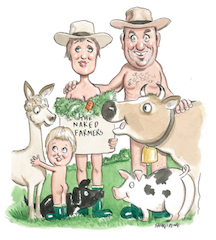A revolution is long overdue in our unconscious over-consumption. We have become inured to where our food or clothes come from or how they reach the supermarket shelves. Most people simply don’t care, as long as it is cheap. They don’t know or care about Genetically Modified food and cotton- the gross manipulation of nature, the fact that ag chemical giant Monsanto is funding GMO, that GMO crops are routinely sprayed with toxic cancer causing chemical Round-Up, and that Monsanto’s aim is to own all the world’s seeds and have them under patent – own the seeds, own all the food in the world – seeds are the beginning of life.
The vast majority couldn’t care less where their meat comes from – many don’t even know which animal their cold cut comes from. We have lost all respect for life – any life, whether it be human or animal. We are merciless, pitiless, selfish, angry. And it may well be that the normal western diet of coffee, meat & alcohol overtaxes the body and fuels our rage. But a shift is happening – populaces are protesting about live exports, which is great – they are beginning to equate animals with suffering and slaughter and their minds are opening to the treatment of the animals they expect on their plate. Ripples on the pond.
Most people don’t know or question what chemicals are used to produce their broad scale farmed fruit and vegetables, and what damage the run off does to the ground where it kills earthworms, dung beetles etc and poisons the ground for generations to come, or how many fish and other stream and river life that same run off causes once it reaches the waterways. Let alone what those same sprays are doing to the bees and air borne insects which are all part of our incredibly complicated ecological tapestry. Cotton, wheat, corn etc . . . it’s so hard to be sure what we are buying if we shop in the big chain stores.
Advertisement
And then there is the way in which supermarkets and big food chains are screwing farmers to the wall on pricing, so they are forced to compromise quality for quantity, using every unnatural means available to meet the demands of a few big buyers. Superphosphate in the soil, locking up the nutrients and salinating the soil, which then leaches into the waterways, killing wildlife etc . . . and on and on it goes.
Of course there are the feedlots, breeding E Coli in cattle by forcing them to eat grain while standing cheek to jowl in unnatural concentration camps, fattening up for slaughter . . . and the hormones and other chemicals used to grow obscenely large chickens to further fill our plates . . . what about the global wave of infertility, surely that is related to all the unnatural hormones in our foods?
Now let’s talk about the power and water used in the industrialised farming system – pumping vast amounts of water onto parched lands – draining the rivers where the wildlife can no longer survive once their lifeblood is dried. The devastating damage done to the landscape in order to produce coal fired power. The senselessness of our preoccupation with destroying the earth to dig coal out of the ground when solar is so readily available. Indeed the industrial revolution is still powering our thinking, growing and raising practices, when we need to revert to a more local, agricultural, and needs based farming system.
But there is a groundswell of people who are questioning the ethics and realities of the food and clothing industries. Who want to know where their food comes from – how it is grown or raised and killed (if they eat meat). People who are putting their consciousness onto their plates and making sure that they can account for the provenance of every mouthful. .
These are often the same people who don’t want thirsty cotton clothing, bleached and then dyed with noxious chemicals. These consumers would rather pay more for organic cotton or hemp – who care about factory slavery in Vietnam, Bangladesh and China. Who prefer natural wool products from sheep and alpacas raised solely for fleece, rather than petrochemically produced clothing which pollutes our blue planet.
We are all hypocrites in one way or another, such is the nature of our human-ness. We all make mistakes and fall down in some way in our consumption choices. It’s hard to be a fully conscious being at all times, in all areas.
As we all tighten our belts and lockdown for a few more years of tight budgetting, it is time to become aware of where our hard earned dollars are going, to buy less and more consciously, closer to home, supporting local farmers and industries and paying for quality, not quantity – getting back to basics.
